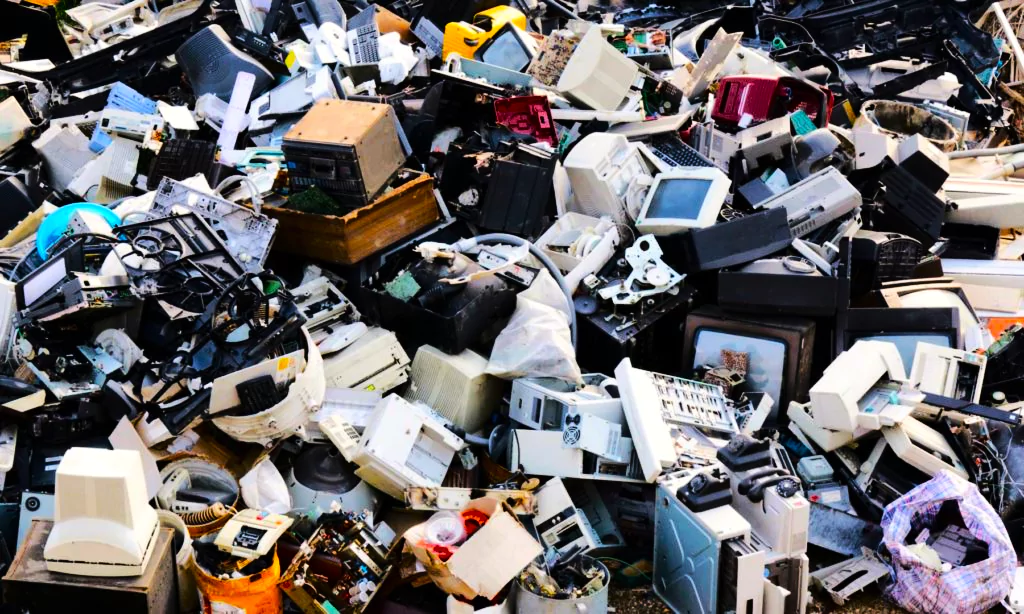Context
Recently, The Government of India mooted to launch a platform for trading e-waste responsibility certificates.
E-waste
- It Refers to all items of electrical and electronic equipment (EEE) and its parts (computers, equipment, home appliances, audio or video products & all of their peripherals )that its owner has discarded as waste without the intent of re-use.

-
Impact of E-waste:
-
On Human Health:
- Affects the nervous system due to the presence of Lead, mercury & cadmium elements.
- It is carcinogenic & causes skin diseases due to Beryllium in E-Waste.
- Disruption in the endocrine system due to Brominated flame retardants present in E-Waste.
-
On Environment:
- Air Pollution: Neurotoxins & chlorinated Dioxins when released into the environment create poisonous smog.
- Soil Pollution: Heavy metals present in it deteriorate soil quality.
- Water Pollution: Groundwater is polluted by Heavy metals like Mercury, lithium, lead & Barium.
- Regulated under E-Waste (Management) Rules, 2022.
- Applies to every manufacturer, producer, refurbisher, dismantler, and recycler.
- Top 3 E-waste Producing Countries: China>USA>India
- Maharashtra is the most E-waste generating state in india.
|
About Online Platform for E-waste Responsibility Certificate
- Aim:
- It will transform & Streamline the EPR certificate market, enhancing transparency and efficiency & facilitating better compliance with guidelines.
- It aims to manage the proliferation of electronic waste such as obsolete mobile phones, laptops, etc.
- Developed by: Central Pollution Control Board (CPCB).
- Features of the Platform:
- Provide flexibility for companies while ensuring they contribute to properly handling e-waste.
- It will increase recycling targets’ achievement.
- It will be a step towards establishing a robust and accountable system for managing this growing environmental challenge.
- Regulation of the Platform:
- The CPCB will establish guidelines for operating the platform and set a price range for EPR certificates.
- The Price Range will be between 30 % and 100% of the environmental compensation amount imposed for failing to meet EPR obligations.
Extended Producer Responsibility (EPR)
- According to the OECD, extended producer responsibility (EPR) is an environmental policy approach, and a producer’s responsibility for a product is extended to the post-consumer stage of a product’s life cycle.
-
An EPR Policy is Characterized by:
-
- The shifting of responsibility (physically and/or economically; fully or partially) upstream toward the producer and away from municipalities; and.
- The provision of incentives to producers to consider environmental considerations when designing their products.
- It seeks to integrate signals related to the environmental characteristics of products and production processes throughout the product chain.
|
About Extended Producer Responsibility (EPR) Certificate System
- Regulated under E-Waste (Management) Rules, 2022.
- A Market-driven Mechanism:
- It allows for the quantification of e-waste recycling efforts and incentivises producers to meet or exceed their EPR obligations.
- It provides a revenue stream for registered recyclers, encouraging more efficient and scalable recycling operations.
- Applicable to:
- All items of electrical and electronic equipment (EEE) and its parts (computers, equipment, home appliances, audio or video products & all of their peripherals )that its owner has discarded as waste without the intent of re-use.
- ‘Orphaned products‘ means non-branded or assembled electrical and electronic equipment as specified in Schedule I or those produced by a company which has closed its operations.
- Obligation for the E-Waste Generating Companies:
- By collecting and processing their waste or
- By purchasing EPR certificates from entities that have exceeded their collection targets.
- They are tradable credits just like green credits or carbon credits.
E-Waste Management Rules 2022
- Objective: To undertake all necessary measures to ensure the e-waste management in a manner that safeguards both human health and the environment from any potential adverse effects.
- Coverage: Every manufacturer, producer refurbisher, dismantler and recycler involved in the manufacture, sale, transfer, purchase, refurbishing, dismantling, recycling and processing of e-waste or electrical and electronic equipment listed in Schedule I, including their components, consumables, parts and spares which make the product operational.
- Exception (Not applicable to):
- Waste batteries (under Battery Waste Management Rules, 2022);
- Packaging plastics (under the Plastic Waste Management Rules, 2016);
- Microenterprise as defined in the Micro, Small and Medium Enterprises Development Act, 2006 (27 of 2006); &
- UNDP reportRadio-active wastes (under the provisions of the Atomic Energy Act, 1962 (33 of 1962).
Also Read: Global Plastic Pollution Treaty Negotiations At INC-3
News Source: Business Standards
![]() 16 Mar 2024
16 Mar 2024